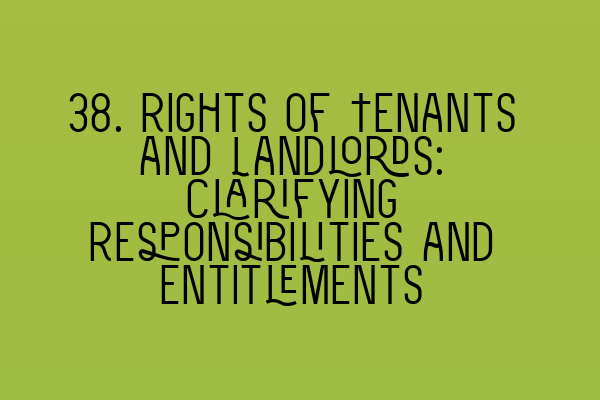**38. Rights of Tenants and Landlords: Clarifying Responsibilities and Entitlements**
If you are a tenant or a landlord, it is crucial to understand your rights and responsibilities to ensure a harmonious and legally compliant tenancy. The relationship between tenants and landlords is governed by a complex set of rules and regulations, which can often be confusing and overwhelming. In this article, we will clarify the key responsibilities and entitlements of both tenants and landlords, providing you with a comprehensive understanding of your rights within the realm of property law.
1. **Tenants’ Rights:**
As a tenant, you have a range of rights that are designed to protect you and ensure a safe and habitable living environment. Understanding these rights is essential to empower yourself as a tenant. Some of the key rights that tenants enjoy include:
**a. Right to a Safe and Habitable Property:**
Landlords have a legal obligation to provide tenants with a property that is safe and fit for habitation. This means that the property must meet certain minimum standards regarding health, safety, and security. In the event that the property falls below these standards, tenants have the right to request necessary repairs or improvements from the landlord. If the landlord fails to address these concerns, tenants may have grounds to seek legal action or terminate the tenancy agreement.
**b. Right to Quiet Enjoyment:**
Tenants have the right to enjoy their rented property without interference from the landlord. This means that landlords cannot enter the property without prior notice (except in cases of emergency) or engage in any behavior that disrupts the tenant’s peaceful enjoyment of the premises.
**c. Right to Privacy:**
Tenants have a right to privacy within their rented property. Landlords must respect this right and cannot enter the premises without the tenant’s permission, except in specific circumstances outlined by the law. Tenants should be provided with reasonable notice if the landlord needs to enter the property for inspections, repairs, or other legitimate reasons.
**d. Right to Deposits Protection:**
In many jurisdictions, landlords are required to protect tenants’ deposits in a government-approved tenancy deposit scheme. This ensures that the deposit is safely held and returned to the tenant at the end of the tenancy, subject to any justifiable deductions for damages or unpaid rent.
To gain a more comprehensive understanding of tenants’ rights, you may want to check out our related article on [SQE 1 Practice Exam Questions](https://fqps.co.uk/sqe/sqe1-preparation/mcq-practice-quiz).
2. **Landlords’ Responsibilities:**
Landlords also have a set of responsibilities to comply with in order to maintain a successful, legal tenancy. These responsibilities include:
**a. Responsibility to Provide Safe and Habitable Accommodation:**
Landlords have a legal duty to ensure that the property they rent out is safe, clean, and fit for habitation. This includes maintaining the structural integrity of the building, maintaining gas and electrical safety, providing proper sanitation facilities, and ensuring adequate fire safety measures are in place.
**b. Responsibility to Repair and Maintain the Property:**
Landlords are responsible for carrying out necessary repairs and maintenance to keep the property in good condition. This includes addressing any defects, damages, or issues that may arise during the tenancy. Failure to undertake necessary repairs could result in legal action by the tenant.
**c. Responsibility to Protect Tenants’ Deposits:**
As mentioned earlier, in many jurisdictions, landlords are required to protect tenants’ deposits in a government-approved deposit protection scheme. This includes registering the deposit within a specified timeframe and providing the tenant with the necessary information regarding its protection.
**d. Responsibility to Respect Tenants’ Rights:**
Landlords must respect their tenants’ rights to privacy, quiet enjoyment, and the peaceful occupation of the property. Unreasonable interference by the landlord, such as entering the property without notice or harassing the tenant, can result in legal consequences.
To delve deeper into landlords’ responsibilities, take a look at our related article on [SQE 2 Preparation Courses](https://fqps.co.uk/sqe/sqe2-preparation).
Understanding the rights and responsibilities of both tenants and landlords is essential for a successful and legally compliant tenancy. By familiarizing yourself with the aforementioned information, you are better equipped to navigate any potential disputes, protect your interests, and maintain a healthy landlord-tenant relationship.
If you want to further enhance your knowledge in property law, we recommend exploring our [SQE 1 Preparation Courses](https://fqps.co.uk/sqe/sqe1-preparation), where you’ll find comprehensive study materials and resources to prepare for the SQE exams.
Stay informed about important dates and deadlines for the SQE exams by checking out our [SRA SQE Exam Dates](https://fqps.co.uk/sqe/sqe1-sqe2-exam-dates) page.
In conclusion, whether you are a tenant or a landlord, being aware of your rights and responsibilities is crucial in maintaining a fair and legally compliant tenancy. By adhering to these guidelines, you can ensure a positive and harmonious renting experience for both parties.
*Note: The information provided in this article is for general informational purposes only and does not constitute legal advice. For specific inquiries about your rights and responsibilities as a tenant or landlord, it is advisable to consult with a qualified legal professional.*
